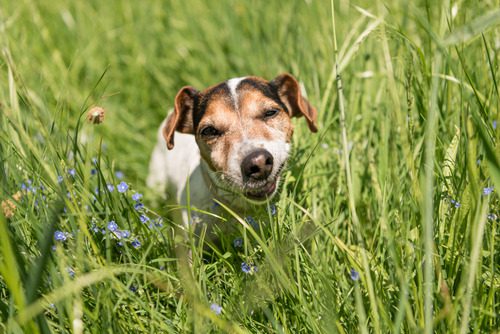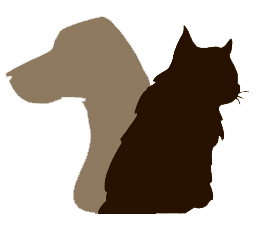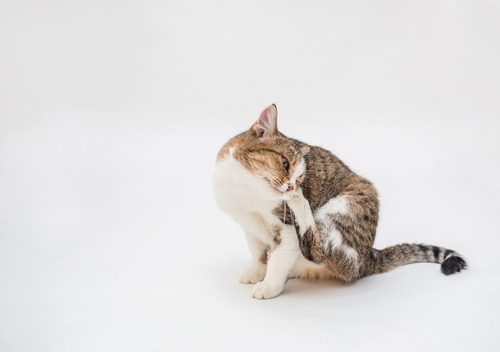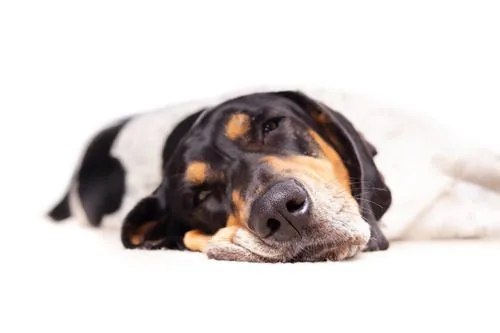Understanding Why Dogs Eat Grass and When to Worry
Dogs are known for their quirky behaviors, and one of the most puzzling is their tendency to eat grass. As pet owners, we often find ourselves wondering why our dogs engage in this seemingly strange habit. While grass-eating is common among canines, it’s natural to have concerns about what it might indicate about your dog’s health. In this blog, we’ll explore the reasons why dogs eat grass and when it might be time to call Mendocino Animal Hospital at (707) 462-8833 or book an appointment online.

Reasons Why Dogs Eat Grass
Dogs eating grass is a behavior observed by many pet owners, and it can be attributed to various factors. Understanding these reasons can help alleviate concerns and provide insight into your dog’s behavior.
Natural Instincts and Ancestral Behavior
One of the primary reasons why dogs eat grass is rooted in their natural instincts and ancestral behavior. Wild canines, such as wolves, often consume plant material as part of their diet. This behavior has been passed down through generations, making it a natural inclination for modern dogs to nibble on grass. For domesticated dogs, this instinct remains, even though their diet has evolved to be more controlled and nutritionally balanced.
Dietary Supplementation
Another reason dogs eat grass is to supplement their diet. Grass contains certain nutrients that might be lacking in their regular food. Dogs are known to seek out fibrous plant material to aid digestion and ensure they are getting a balanced intake of nutrients. If your dog’s diet is deficient in fiber, they may turn to grass as a natural supplement. Providing a high-quality, balanced diet can help reduce this behavior.
Boredom and Behavioral Stimulation
Dogs are curious and active animals that require mental and physical stimulation. Sometimes, dogs eat grass out of boredom or as a way to engage their senses. If a dog is left alone for long periods or lacks sufficient exercise and playtime, they may turn to grass-eating as a form of entertainment. Ensuring your dog has plenty of activities and toys can help divert their attention from this habit.
When to Worry About Grass-Eating
While grass-eating is generally considered normal behavior for dogs, there are certain situations where it might indicate an underlying issue. Knowing when to worry can help you take appropriate action to ensure your dog’s well-being.
Signs of Gastrointestinal Distress
If your dog is eating grass and showing signs of gastrointestinal distress, it could be a cause for concern. Symptoms such as vomiting, diarrhea, or excessive drooling may indicate an upset stomach or other digestive issues. In such cases, it’s essential to monitor your dog’s behavior and consult with your veterinarian at Mendocino Animal Hospital if the symptoms persist.
Frequent or Compulsive Grass-Eating
Occasional grass-eating is typically harmless, but if your dog is frequently or compulsively eating grass, it might be worth investigating further. Compulsive grass-eating can sometimes be a sign of a more serious underlying health issue, such as gastrointestinal disorders, parasites, or dietary deficiencies. If you notice this behavior becoming more frequent, schedule an appointment with your veterinarian to rule out any medical concerns.
Ingestion of Harmful Substances
One potential risk of grass-eating is the ingestion of harmful substances, such as pesticides, herbicides, or toxic plants. Ensure that the grass your dog has access to is free from chemicals and safe for consumption. If you suspect your dog has ingested something harmful, contact Mendocino Animal Hospital immediately for advice and treatment.
How to Manage and Prevent Grass-Eating
Managing and preventing grass-eating behavior involves addressing the underlying causes and providing appropriate alternatives for your dog. Here are some strategies to help reduce this habit.
- Providing a Balanced Diet: Ensuring your dog receives a balanced and nutritious diet is crucial in reducing grass-eating behavior. High-quality commercial dog food that meets all of your dog’s nutritional needs can help prevent dietary deficiencies. Consult with your veterinarian to determine the best diet for your dog based on their age, breed, and health status.
- Increasing Physical and Mental Stimulation: As mentioned earlier, boredom and lack of stimulation can lead to grass-eating. Increasing your dog’s physical and mental activities can help divert their attention from this habit. Regular walks, playtime, and interactive toys can keep your dog engaged and satisfied. Enrichment activities, such as puzzle feeders and training sessions, can also provide mental stimulation.
- Monitoring and Redirecting Behavior: Keep an eye on your dog’s grass-eating behavior and try to redirect their attention when you notice it. Offering a toy or engaging in a play session can help distract them from eating grass. Positive reinforcement techniques, such as rewarding your dog for engaging in alternative behaviors, can also be effective in curbing this habit.
Maintaining Your Dog’s Health and Happiness
Understanding why dogs eat grass and when to worry can help you better manage this behavior and ensure your dog’s health and happiness. While occasional grass-eating is usually harmless, it’s essential to be aware of any changes in your dog’s behavior and seek veterinary advice if needed. If you have concerns about your dog’s grass-eating or overall health, don’t hesitate to call Mendocino Animal Hospital at (707) 462-8833 or book an appointment online. Our team is here to provide the care and support your dog needs to thrive.
Recent Posts
Dog UTI Symptoms
Urinary tract infections (UTIs) can affect dogs of any age, breed, or size—and when they do, it…
Ear Mites in Cats
If your cat has been shaking their head, scratching around their ears, or showing signs of discomfort,…
Can Dogs Have Cheese?
Many pet owners enjoy sharing small bites of their favorite snacks with their dogs—especially something as tempting…
What Do Dogs Dream About?
Have you ever watched your dog sleeping—legs twitching, nose wriggling, tail flicking—and wondered what’s going on in…
Is it Normal That My Dog is Snoring?
Dogs snoring can be adorable, but it can also raise concerns for pet owners. If you’re wondering,…
About Mendocino Animal Hospital
At Mendocino Animal Hospital, we believe in fostering the human-animal bond with excellent veterinary medicine. Our full-service veterinary practice operates in Ukiah, CA with a team of skilled veterinarians and a passionate, talented support staff who make you feel like a part of the family.
As an AAHA-accredited animal hospital, every service and aspect of our practice meets AAHA’s Standards of Excellence. No matter what your pet comes in for, they’ll receive only the best in care, compassion, and service.





